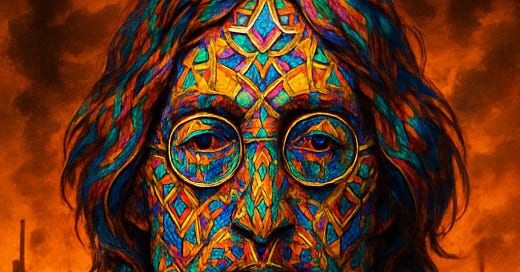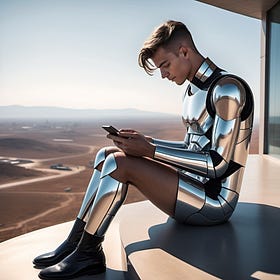Humanity’s demise is the least interesting thing about the rise of AI
"A species cannot evolve when it is extinct." And other great party-starter conversational hacks you can try for yourself.
“I am agnostic about the end of humanity.”
At least that’s what I tell people at parties who ask about what I do. Of all the things I work on, my attempts to discern how artificial intelligence might influence human evolution are the most translatable to standing around drink-in-hand chatting to new acquaintances.
The obvious conclusion to which most partygoers leap is that I know whether AI will destroy all life on earth, outcompete humans for precious resources, or merely kill us all. The more generous listeners assume I’m all about saving humanity and the world from these bleak possible futures.
I don’t, and I’m not.
It’s not that I don’t care about people. It is just that while stark dystopias make for compelling stories, they represent only the extremes. Perhaps AI will end human existence as we know it. Perhaps it won’t. It is absolutely worth considering the immediate and long-term dangers presented by AI and how to avoid them. Some super-intelligent people think, write and broadcast about those “existential risks”, and I am exceedingly glad they do.
Those most extreme scenarios that leave everybody dead are not only a giant bummer for our entire kind, but also a more arcane kind of particular bummer for those of us interested in human evolution. Extinction means, among other things, that there will be no more evolution. What interests me most is what happens between now and humanity’s extinction, however that eventually – and hopefully only in the far-distant future – comes about.
I don’t go out to a lot of parties these days. I tell myself it’s because I’m slaving away at this newish research direction rather than, say, a scarcity of invitations. If, unlike most party guests, you’re still here and interested in what I have to say, then know that the long-term consequences for humans of living in a world teeming with AI is a topic you’re going to read a lot more about in the coming years. I hope the ideas on this Substack and in my books can contribute in useful, interesting ways.
It’s already happening
Artificially intelligent technologies (I just call them AIs unless there’s a good reason to get specific) are already affecting the lives people lead. Some effects are obvious, like the zombification of a generation by smartphones and social media. Others are less easy to discern. Is app-based dating responsible for declining birth rates?
What is clear, at least after a moment’s consideration, is that AI’s effects on the lives people lead, and how they live, die, and reproduce, are spreading like oil across the sloshing water of human societies. The absolute certainty that AI will alter human lives in ever more numerous and profound ways compels me to write.
Anything that shapes the lives of a large number of people will inevitably affect human genes and culture. Those two entangled strands of information, together, document and define who we are. We have a word for what happens when genes and/or culture change: evolution.
The time has come to look at how AI will shape the biological and cultural evolution of our species. Evolution, to misquote John Lennon, is just something that happens when we are busy making other plans. Or when we pick up our iPhones to make other plans and are distracted by a never-ending scroll of social media videos. It is worth looking at the lives that people currently do lead, or are likely to lead in the near future, alongside the forms of AI that are already here or likely to emerge very soon.
To understand how the rise and spread of AI will shape human biological and cultural evolution, we need to understand that this isn’t a tussle between humanity and some kind of singular AI entity. Humans increasingly inhabit an AI-rich ecosystem filled with big, lumbering beasts like self-driving trucks, predator-like autonomous weapons, and competitors like energy-hungry computer farms. The size of those AI-animated technologies make them, and the dangers they present, quite apparent. Far more insidious are the parasites (social media that drain your attention in service to advertising) and viruses (smart forms of malware that replicate in our computer systems). As is true for biological parasites and viruses, these digital forms are likely to feature among the major drivers of evolution.
Our social environment is also filled with AI agents that act a lot like people do. I wrote about these in my book Artificial Intimacy. Virtual friends chat with us. Some of them – technologies I call ‘digital lovers’ – can talk dirty with us. We are promised they will soon be able to hold up the other end of a steamy sex scene in virtual reality. Matchmaker algorithms pair us with human friends, dates and potential employers, and with media we might want to watch or listen to.
Of course, the comparisons between the AI and non-AI inhabitants of our environment can only take us so far: AI is carving out niches unlike any inhabited by biological organisms. But an examination of how the players in our biological and social environments have shaped humanity is a great place to start considering how AI is likely to make its mark on our genes and cultures.
How will the technologies of today and the near future shape which ideas, which ideologies, and which systems of managing our societies prevail in the coming decades and centuries? How will they influence which individual humans, with which genes, become the ancestors of the coming generations? The answers to those questions will impact not only the individuals involved, but the evolution of human bodies, brains, and behaviours. And even if the effects are subtle, they can stack up across generations to effect surprisingly powerful change.
After all, that’s how we came to be who we are today.
Smaller brains? Fewer friends? Some thoughts on how AI might influence human evolution
What will humans be like generations from now in a world transformed by artificial intelligence (AI)? Plenty of thinkers have applied themselves to questions like this, considering how AI will alter lives – often for better, sometimes for worse.





